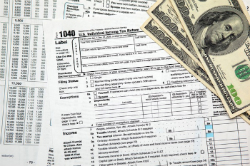Congress may authorize the hiring of private collection agencies to collect back taxes. Congress added a proposal in the Expiring Provisions Improvement Reform and Efficiency (EXPIRE) Act of 2014 which would authorize the IRS to contract with private collection agencies to recover back taxes. Congress believes that it can recover $2.4 billion in unpaid federal tax debt over the next 10 years through the use of private collection agencies. Currently, the NJ Division of Taxation utilizes a private collection agency.
 This is not the first time that Congress outsourced private tax collectors. The IRS utilized private tax collectors in 1996 and 2004. Both times the IRS stopped using private tax collectors because they were deemed inefficient in the collection of back taxes. The IRS Oversight Board (Oversight Board), a nine-member independent body charged to oversee the IRS operations, agrees. The Oversight Board believes private collection firms are not as effective as IRS personnel in charge of collection (Revenue Officers and the Automated Collections Unit).
This is not the first time that Congress outsourced private tax collectors. The IRS utilized private tax collectors in 1996 and 2004. Both times the IRS stopped using private tax collectors because they were deemed inefficient in the collection of back taxes. The IRS Oversight Board (Oversight Board), a nine-member independent body charged to oversee the IRS operations, agrees. The Oversight Board believes private collection firms are not as effective as IRS personnel in charge of collection (Revenue Officers and the Automated Collections Unit).
The IRS is missing out on billions of dollars by not collecting taxes within the time frame permitted by Congress. Generally speaking, the IRS has 10 years to collect a back tax or reduce the tax debt to a judgment. Currently, many cases are sitting in the queue waiting to be assigned. If the cases are not assigned, within the 10 year statute, then the tax debt is forgiven. I have witnessed the IRS missing out on hundreds of thousands of dollars in back taxes. For example, last week, I noticed that the IRS missed assessing a trust fund recovery penalty. If the taxpayer’s business does not pay the FICA portion of payroll taxes, then the IRS can pierce through the business and assess the payroll tax owed against an individual.
In order to assess personal liability for payroll taxes, the IRS must determine that the individual is responsible and willful with regard to the collection of back payroll taxes. The assessment of a payroll tax against an individual is known as the Trust Fund Recovery Penalty (TFRP). The IRS has three years from April 15 of the year following accrual or the date the Form 941 was actually filed, whichever is later to assess the TFRP. For a brief discussion, you can read our FAQ. In my case, the IRS missed the 3 year TFRP window. Unfortunately, the corporation was no longer operating and had not assets. Therefore, the IRS lost its opportunity to collect upon the taxes owed. If the IRS assessed the TFRP, then it would have 10 years to collect the back tax from the individual(s) the corporation, if active.
Congress is well aware that the back tax collection statute is running out on billions of dollars of uncollected tax. The EXPIRE Act would assist in helping the IRS avoid missing the collection tax statute. If more than one-third of the applicable statute of limitations period had lapsed and no IRS employee has been assigned, then the case would be outsourced to a private contractor.
If private tax collectors are utilized, the IRS would still handle offer-in-compromises (a tax settlement), negotiating installment agreements, or reviewing innocent spouse relief. Additionally, the IRS would handle in house tax-related identity theft cases, cases in exams, litigation, criminal investigation, or levy; or IRS appeals.
A back tax problem can be financially devastating for individuals and businesses. The Law Offices of Todd S. Unger, Esq. focuses exclusively on tax dispute and resolution. Whether you have a small problem or a large tax bill, tax lawyer, Todd S. Unger can help. If you require assistance negotiating your back taxes, then contact the Law Offices of Todd S. Unger, Esq. LLC today. The IRS has been decimated by budget cuts and EXPIRE is a sign that Congress is ready to close the tax gap by aggressive tax collection. There is no time to wait, resolve your tax debt today by calling a tax attorney (877) 544-4743.

